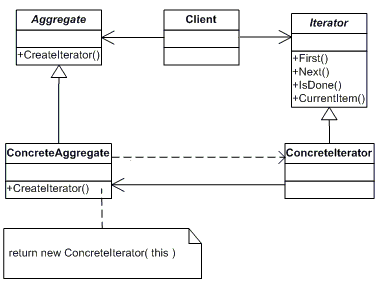Provide a way to access the elements of an aggregate object sequentially without exposing its underlying representation.
Participants
- Iterator: defines an interface for accessing and traversing elements.
- ConcreteIterator: implements the Iterator interface. Keeps track of the current position in the traversal of the aggregate.
- Aggregate: defines an interface for creating an Iterator object
- ConcreteAggregate: implements the Iterator creation interface to return an instance of the proper ConcreteIterator
Code
public class Main {
public static void main(String[] args) {
String items[] = { "Item A", "Item B", "Item C", "Item D" };
Aggregate aggregate = new ConcreteAggregate(items);
for (Iterator iter = aggregate.getIterator(); iter.hasNext();) {
String item = (String) iter.next();
System.out.println(item);
}
}
}
public interface Aggregate {
Iterator getIterator();
}
public class ConcreteAggregate implements Aggregate {
private String items[];
public ConcreteAggregate(String[] items) {
this.items = items;
}
@Override
public Iterator getIterator() {
return new ConcreteIterator(items);
}
}
public interface Iterator {
public boolean hasNext();
public Object next();
}
public class ConcreteIterator implements Iterator {
private String items[];
private int index;
public ConcreteIterator(String[] items) {
this.items = items;
}
@Override
public boolean hasNext() {
if (index < items.length) {
return true;
}
return false;
}
@Override
public Object next() {
if (this.hasNext()) {
return items[index++];
}
return null;
}
}
Output
Item A
Item B
Item C
Item D









Top comments (1)
forEach is a defult method of the Iterable interface which uses the java.util.Iterator interface. So, at the end of the day, implicitly is the same. Of course, we do not need to reinvent the wheel. I would use your code.